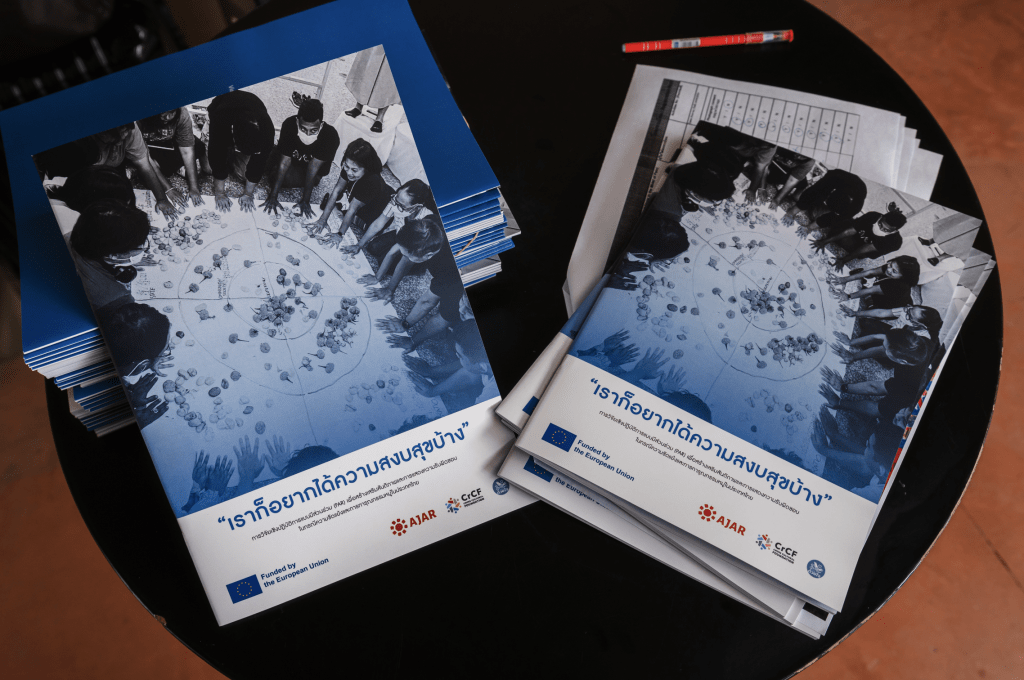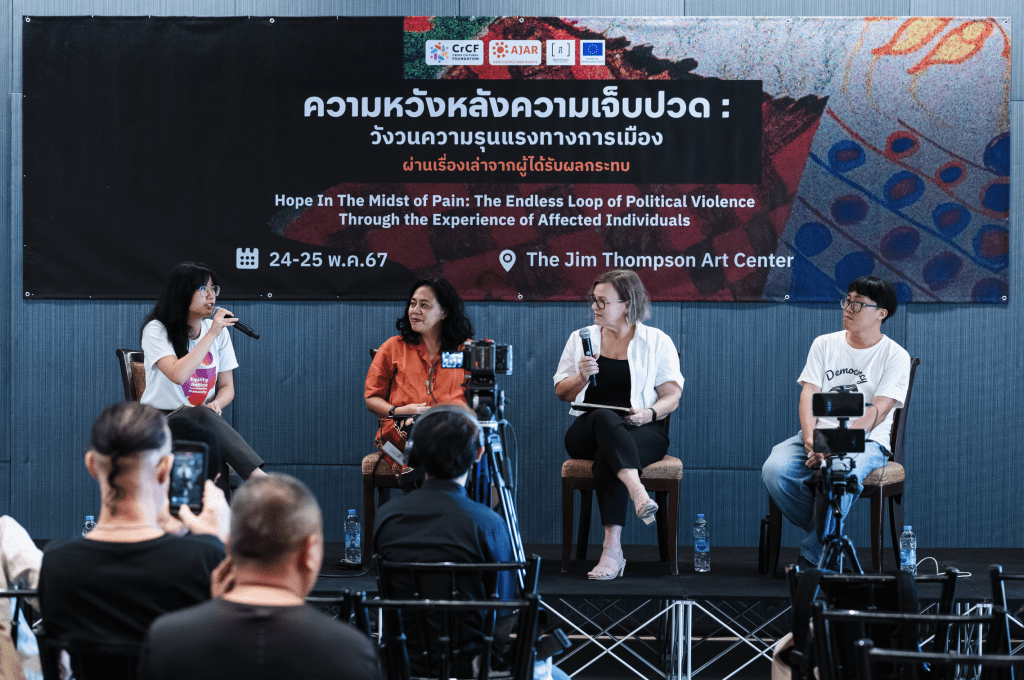Thailand has a long history of serious human rights violations, particularly in the context of nation-wide political uprisings as well as in the country’s southern border regions. Despite this, many past violations remain unacknowledged and unaddressed; indeed, the scale and severity of crimes remain grossly underreported in some areas. Recent years have seen increasing understanding among civil society of the importance of transitional justice and peacebuilding.
Cross-Cultural Foundation (CrCF), has been working to provide advocacy, legal aid and education for victims and survivors of torture, enforced disappearance, and abuse at the hands of authorities in Thailand. Through a process which commenced in 2022 with the support of Asia Justice and Rights and other civil society organisations, CrCF has focused on strengthening civil society and victims’ groups’ understanding of transitional justice mechanisms and how they contribute to the peacebuilding process. This May, CrCF also collaborated with the Museum of Popular History to display the “Diary of the People: Past, Present and Our Dreams” Art Exhibition.
On 23-24 May 2024 in Bangkok, CrCF held a two-day National Seminar. This included disseminating the findings of two research reports (1) the joint report with AJAR and Duay Jai Group based on participatory action research (PAR) conducted in 2022-2023 titled “We Just Want to Live in Peace – Strengthening Peace and Accountability for Conflict and Atrocities in Thailand” and, (2) a research report titled “Transition to Justice – Policy Recommendations by Affected Individuals of Political Violence during 2014 to 2023”. This was accompanied by an exhibition of The Diary of the People: Past, Present and Our Dreams art exhibition.

Mr. Suraphong Kongchantuek, Chairman of CrCF opened the seminar by reflecting on the pain and struggle in striving for justice in Thailand. He stated that, “In Thailand’s democratic government, we have the rule of law. Meanwhile, we find that many people do not follow the rule of law. Steps have not been taken to allow people to live together peacefully, which has led to our pain and suffering in the past. One of the remedies to this, is to let these pains be a lesson.“
Associate Professor Dr Prajak Kongkirati, Lecturer in the Department of Politics and Government, Thammasat University in his opening remarks highlighted the need to integrate a transitional justice perspective to support a process of accountability in Thailand. He stated, “Transitional justice is not [only] about dealing with the past, it is about focusing on the present and the future. [It is important] to create a society into the future that lives together in peace. We are interested in the past to correct mistakes and; to prevent these actions from happening again.”
During the seminar, CrCF launched the findings of the joint PAR report with AJAR and Duay Jai Group; the report provides findings and key recommendations based on the experiences of forty-three participants. The research included victims of political violence, family members of victims of human rights violations, protesters, activists, human rights defenders and youth. It also included participants from the Deep South and parts of the conflict areas of Pattani, Yala, Narathiwat and parts of Songkhla focusing on locally-led initiatives for sustainable peace and the non-recurrence of violence.

CrCF also launched policy recommendations on individuals impacted by political violence from 2014 to 2023 which urges the government to acknowledge past violence, restore justice and provide urgent reparations for survivors and political activists in Thailand. Additionally, AJAR Regional Program Manager, Indria Fernida presented the Transitional Justice Handbook, emphasising lessons learned internationally. The Thai version of the handbook will be launched soon.
The national seminar was attended by a diverse group of over 150 participants and included political activists, academics, survivors and representatives of the government. A series of panel discussions that delved into topics on the current struggle of the civil society movement and state responsibility for the events of the 6 October 2020 Thai political protest, and the 20 years of conflict in the Deep South, Thailand.
In reflecting on the process of transitional justice and peacebuilding in the Deep South, Asama Mungkornchai, Assistant Professor of Political Science at the Prince of Songkla University stated, “In the Deep South, it is hard to achieve peace and is violent. There is no equality. One thing you want for the peace process is the political atmosphere to facilitate a conversation which addresses the past.” The implementation of a transitional justice framework is important, so that victims can understand their right to remedy, and the government acknowledges their obligation and takes responsibility.
There was also an intensive discussion on the proposed People’s Amnesty Bill which is currently idle in the parliament. A network of Thai CSOs have organised and proposed an Amnesty Bill for victims of political prosecution in response to the growing criminalisation of people exercising their rights to freedom of expression and assembly. If adopted, the Bill would provide amnesty to people who have been criminally charged or prosecuted under the lèse-majesté law and Computer Crimes Act.
The Diary of the People: Past, Present and Our Dreams Art Exhibition, in collaboration with the Museum of Popular History, included artworks from the activity “Let Art Heal” conducted in December 2023. It used art as a medium for human rights defenders to reflect on their emotions, personal experiences, hopes and dreams. The exhibit featured diary-style interviews with explanations of their thoughts behind the canvas as well as various objects related to the democracy movement. Drawing on the experiences of CrCF, AJAR and the Museum of Popular History, the forum of History of the People, By the People through Art reflected on what strategies have been effective at integrating art as healing for survivors and a campaign tool for raising public awareness. It also highlighted how important collective archives are in human rights documentation.
There was a mourning session for Netiporn ‘Bung’ Sanesangkhom – a Thai pro-democracy activist and friend of CrCF – who recently passed away in detention while on charges of violating Article 112 of Thailand’s Criminal Code (lèse-majesté) on 14 May 2024. Bung was one of the participants of the Let Art Heal session. Pornpen Khongkachonkiet, Director of CrCF reflected, “I hope Bung can live in peace as she drew on her dreams in her picture.” Participants mourned together the loss of such a young activist – paying their respect to her immense sacrifice and placing flowers by her name and picture.
This activity is part of the #PeacebuildingandTJ project to promote accountability for peace through community-led transitional justice with a focus on institutional reform and non-recurrence. Held in collaboration with Asia Justice and Rights, Cross-Cultural Foundation (CrCF) (Thailand), Solomon Islands Trauma Healing Association (SITHA) (Solomon Islands), and Asosiasaun Chega! Ba Ita (ACbit) (Timor-Leste), was made possible with the support of the European Union.